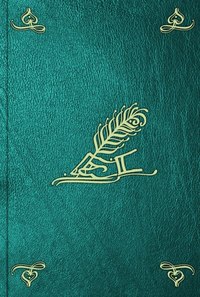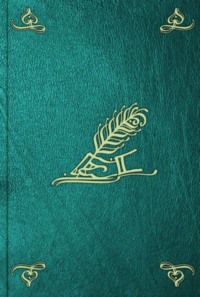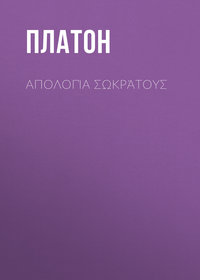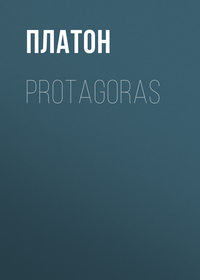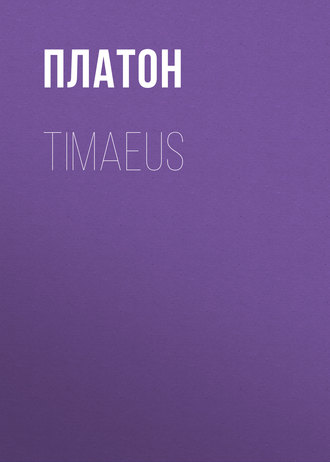 полная версия
полная версияTimaeus
After weighing one against the other all these complicated probabilities, the final conclusion at which we arrive is that there is nearly as much to be said on the one side of the question as on the other, and that we are not perfectly certain, whether, as Bockh and the majority of commentators, ancient as well as modern, are inclined to believe, Plato thought that the earth was at rest in the centre of the universe, or, as Aristotle and Mr. Grote suppose, that it revolved on its axis. Whether we assume the earth to be stationary in the centre of the universe, or to revolve with the heavens, no explanation is given of the variation in the length of days and nights at different times of the year. The relations of the earth and heavens are so indistinct in the Timaeus and so figurative in the Phaedo, Phaedrus and Republic, that we must give up the hope of ascertaining how they were imagined by Plato, if he had any fixed or scientific conception of them at all.
Section 5
The soul of the world is framed on the analogy of the soul of man, and many traces of anthropomorphism blend with Plato's highest flights of idealism. The heavenly bodies are endowed with thought; the principles of the same and other exist in the universe as well as in the human mind. The soul of man is made out of the remains of the elements which had been used in creating the soul of the world; these remains, however, are diluted to the third degree; by this Plato expresses the measure of the difference between the soul human and divine. The human soul, like the cosmical, is framed before the body, as the mind is before the soul of either – this is the order of the divine work – and the finer parts of the body, which are more akin to the soul, such as the spinal marrow, are prior to the bones and flesh. The brain, the containing vessel of the divine part of the soul, is (nearly) in the form of a globe, which is the image of the gods, who are the stars, and of the universe.
There is, however, an inconsistency in Plato's manner of conceiving the soul of man; he cannot get rid of the element of necessity which is allowed to enter. He does not, like Kant, attempt to vindicate for men a freedom out of space and time; but he acknowledges him to be subject to the influence of external causes, and leaves hardly any place for freedom of the will. The lusts of men are caused by their bodily constitution, though they may be increased by bad education and bad laws, which implies that they may be decreased by good education and good laws. He appears to have an inkling of the truth that to the higher nature of man evil is involuntary. This is mixed up with the view which, while apparently agreeing with it, is in reality the opposite of it, that vice is due to physical causes. In the Timaeus, as well as in the Laws, he also regards vices and crimes as simply involuntary; they are diseases analogous to the diseases of the body, and arising out of the same causes. If we draw together the opposite poles of Plato's system, we find that, like Spinoza, he combines idealism with fatalism.
The soul of man is divided by him into three parts, answering roughly to the charioteer and steeds of the Phaedrus, and to the (Greek) of the Republic and Nicomachean Ethics. First, there is the immortal nature of which the brain is the seat, and which is akin to the soul of the universe. This alone thinks and knows and is the ruler of the whole. Secondly, there is the higher mortal soul which, though liable to perturbations of her own, takes the side of reason against the lower appetites. The seat of this is the heart, in which courage, anger, and all the nobler affections are supposed to reside. There the veins all meet; it is their centre or house of guard whence they carry the orders of the thinking being to the extremities of his kingdom. There is also a third or appetitive soul, which receives the commands of the immortal part, not immediately but mediately, through the liver, which reflects on its surface the admonitions and threats of the reason.
The liver is imagined by Plato to be a smooth and bright substance, having a store of sweetness and also of bitterness, which reason freely uses in the execution of her mandates. In this region, as ancient superstition told, were to be found intimations of the future. But Plato is careful to observe that although such knowledge is given to the inferior parts of man, it requires to be interpreted by the superior. Reason, and not enthusiasm, is the true guide of man; he is only inspired when he is demented by some distemper or possession. The ancient saying, that 'only a man in his senses can judge of his own actions,' is approved by modern philosophy too. The same irony which appears in Plato's remark, that 'the men of old time must surely have known the gods who were their ancestors, and we should believe them as custom requires,' is also manifest in his account of divination.
The appetitive soul is seated in the belly, and there imprisoned like a wild beast, far away from the council chamber, as Plato graphically calls the head, in order that the animal passions may not interfere with the deliberations of reason. Though the soul is said by him to be prior to the body, yet we cannot help seeing that it is constructed on the model of the body – the threefold division into the rational, passionate, and appetitive corresponding to the head, heart and belly. The human soul differs from the soul of the world in this respect, that it is enveloped and finds its expression in matter, whereas the soul of the world is not only enveloped or diffused in matter, but is the element in which matter moves. The breath of man is within him, but the air or aether of heaven is the element which surrounds him and all things.
Pleasure and pain are attributed in the Timaeus to the suddenness of our sensations – the first being a sudden restoration, the second a sudden violation, of nature (Phileb.). The sensations become conscious to us when they are exceptional. Sight is not attended either by pleasure or pain, but hunger and the appeasing of hunger are pleasant and painful because they are extraordinary.
Section 6
I shall not attempt to connect the physiological speculations of Plato either with ancient or modern medicine. What light I can throw upon them will be derived from the comparison of them with his general system.
There is no principle so apparent in the physics of the Timaeus, or in ancient physics generally, as that of continuity. The world is conceived of as a whole, and the elements are formed into and out of one another; the varieties of substances and processes are hardly known or noticed. And in a similar manner the human body is conceived of as a whole, and the different substances of which, to a superficial observer, it appears to be composed – the blood, flesh, sinews – like the elements out of which they are formed, are supposed to pass into one another in regular order, while the infinite complexity of the human frame remains unobserved. And diseases arise from the opposite process – when the natural proportions of the four elements are disturbed, and the secondary substances which are formed out of them, namely, blood, flesh, sinews, are generated in an inverse order.
Plato found heat and air within the human frame, and the blood circulating in every part. He assumes in language almost unintelligible to us that a network of fire and air envelopes the greater part of the body. This outer net contains two lesser nets, one corresponding to the stomach, the other to the lungs; and the entrance to the latter is forked or divided into two passages which lead to the nostrils and to the mouth. In the process of respiration the external net is said to find a way in and out of the pores of the skin: while the interior of it and the lesser nets move alternately into each other. The whole description is figurative, as Plato himself implies when he speaks of a 'fountain of fire which we compare to the network of a creel.' He really means by this what we should describe as a state of heat or temperature in the interior of the body. The 'fountain of fire' or heat is also in a figure the circulation of the blood. The passage is partly imagination, partly fact.
He has a singular theory of respiration for which he accounts solely by the movement of the air in and out of the body; he does not attribute any part of the process to the action of the body itself. The air has a double ingress and a double exit, through the mouth or nostrils, and through the skin. When exhaled through the mouth or nostrils, it leaves a vacuum which is filled up by other air finding a way in through the pores, this air being thrust out of its place by the exhalation from the mouth and nostrils. There is also a corresponding process of inhalation through the mouth or nostrils, and of exhalation through the pores. The inhalation through the pores appears to take place nearly at the same time as the exhalation through the mouth; and conversely. The internal fire is in either case the propelling cause outwards – the inhaled air, when heated by it, having a natural tendency to move out of the body to the place of fire; while the impossibility of a vacuum is the propelling cause inwards.
Thus we see that this singular theory is dependent on two principles largely employed by Plato in explaining the operations of nature, the impossibility of a vacuum and the attraction of like to like. To these there has to be added a third principle, which is the condition of the action of the other two, – the interpenetration of particles in proportion to their density or rarity. It is this which enables fire and air to permeate the flesh.
Plato's account of digestion and the circulation of the blood is closely connected with his theory of respiration. Digestion is supposed to be effected by the action of the internal fire, which in the process of respiration moves into the stomach and minces the food. As the fire returns to its place, it takes with it the minced food or blood; and in this way the veins are replenished. Plato does not enquire how the blood is separated from the faeces.
Of the anatomy and functions of the body he knew very little, – e.g. of the uses of the nerves in conveying motion and sensation, which he supposed to be communicated by the bones and veins; he was also ignorant of the distinction between veins and arteries; – the latter term he applies to the vessels which conduct air from the mouth to the lungs; – he supposes the lung to be hollow and bloodless; the spinal marrow he conceives to be the seed of generation; he confuses the parts of the body with the states of the body – the network of fire and air is spoken of as a bodily organ; he has absolutely no idea of the phenomena of respiration, which he attributes to a law of equalization in nature, the air which is breathed out displacing other air which finds a way in; he is wholly unacquainted with the process of digestion. Except the general divisions into the spleen, the liver, the belly, and the lungs, and the obvious distinctions of flesh, bones, and the limbs of the body, we find nothing that reminds us of anatomical facts. But we find much which is derived from his theory of the universe, and transferred to man, as there is much also in his theory of the universe which is suggested by man. The microcosm of the human body is the lesser image of the macrocosm. The courses of the same and the other affect both; they are made of the same elements and therefore in the same proportions. Both are intelligent natures endued with the power of self-motion, and the same equipoise is maintained in both. The animal is a sort of 'world' to the particles of the blood which circulate in it. All the four elements entered into the original composition of the human frame; the bone was formed out of smooth earth; liquids of various kinds pass to and fro; the network of fire and air irrigates the veins. Infancy and childhood is the chaos or first turbid flux of sense prior to the establishment of order; the intervals of time which may be observed in some intermittent fevers correspond to the density of the elements. The spinal marrow, including the brain, is formed out of the finest sorts of triangles, and is the connecting link between body and mind. Health is only to be preserved by imitating the motions of the world in space, which is the mother and nurse of generation. The work of digestion is carried on by the superior sharpness of the triangles forming the substances of the human body to those which are introduced into it in the shape of food. The freshest and acutest forms of triangles are those that are found in children, but they become more obtuse with advancing years; and when they finally wear out and fall to pieces, old age and death supervene.
As in the Republic, Plato is still the enemy of the purgative treatment of physicians, which, except in extreme cases, no man of sense will ever adopt. For, as he adds, with an insight into the truth, 'every disease is akin to the nature of the living being and is only irritated by stimulants.' He is of opinion that nature should be left to herself, and is inclined to think that physicians are in vain (Laws – where he says that warm baths would be more beneficial to the limbs of the aged rustic than the prescriptions of a not over-wise doctor). If he seems to be extreme in his condemnation of medicine and to rely too much on diet and exercise, he might appeal to nearly all the best physicians of our own age in support of his opinions, who often speak to their patients of the worthlessness of drugs. For we ourselves are sceptical about medicine, and very unwilling to submit to the purgative treatment of physicians. May we not claim for Plato an anticipation of modern ideas as about some questions of astronomy and physics, so also about medicine? As in the Charmides he tells us that the body cannot be cured without the soul, so in the Timaeus he strongly asserts the sympathy of soul and body; any defect of either is the occasion of the greatest discord and disproportion in the other. Here too may be a presentiment that in the medicine of the future the interdependence of mind and body will be more fully recognized, and that the influence of the one over the other may be exerted in a manner which is not now thought possible.
Section 7
In Plato's explanation of sensation we are struck by the fact that he has not the same distinct conception of organs of sense which is familiar to ourselves. The senses are not instruments, but rather passages, through which external objects strike upon the mind. The eye is the aperture through which the stream of vision passes, the ear is the aperture through which the vibrations of sound pass. But that the complex structure of the eye or the ear is in any sense the cause of sight and hearing he seems hardly to be aware.
The process of sight is the most complicated (Rep.), and consists of three elements – the light which is supposed to reside within the eye, the light of the sun, and the light emitted from external objects. When the light of the eye meets the light of the sun, and both together meet the light issuing from an external object, this is the simple act of sight. When the particles of light which proceed from the object are exactly equal to the particles of the visual ray which meet them from within, then the body is transparent. If they are larger and contract the visual ray, a black colour is produced; if they are smaller and dilate it, a white. Other phenomena are produced by the variety and motion of light. A sudden flash of fire at once elicits light and moisture from the eye, and causes a bright colour. A more subdued light, on mingling with the moisture of the eye, produces a red colour. Out of these elements all other colours are derived. All of them are combinations of bright and red with white and black. Plato himself tells us that he does not know in what proportions they combine, and he is of opinion that such knowledge is granted to the gods only. To have seen the affinity of them to each other and their connection with light, is not a bad basis for a theory of colours. We must remember that they were not distinctly defined to his, as they are to our eyes; he saw them, not as they are divided in the prism, or artificially manufactured for the painter's use, but as they exist in nature, blended and confused with one another.
We can hardly agree with him when he tells us that smells do not admit of kinds. He seems to think that no definite qualities can attach to bodies which are in a state of transition or evaporation; he also makes the subtle observation that smells must be denser than air, though thinner than water, because when there is an obstruction to the breathing, air can penetrate, but not smell.
The affections peculiar to the tongue are of various kinds, and, like many other affections, are caused by contraction and dilation. Some of them are produced by rough, others by abstergent, others by inflammatory substances, – these act upon the testing instruments of the tongue, and produce a more or less disagreeable sensation, while other particles congenial to the tongue soften and harmonize them. The instruments of taste reach from the tongue to the heart. Plato has a lively sense of the manner in which sensation and motion are communicated from one part of the body to the other, though he confuses the affections with the organs. Hearing is a blow which passes through the ear and ends in the region of the liver, being transmitted by means of the air, the brain, and the blood to the soul. The swifter sound is acute, the sound which moves slowly is grave. A great body of sound is loud, the opposite is low. Discord is produced by the swifter and slower motions of two sounds, and is converted into harmony when the swifter motions begin to pause and are overtaken by the slower.
The general phenomena of sensation are partly internal, but the more violent are caused by conflict with external objects. Proceeding by a method of superficial observation, Plato remarks that the more sensitive parts of the human frame are those which are least covered by flesh, as is the case with the head and the elbows. Man, if his head had been covered with a thicker pulp of flesh, might have been a longer-lived animal than he is, but could not have had as quick perceptions. On the other hand, the tongue is one of the most sensitive of organs; but then this is made, not to be a covering to the bones which contain the marrow or source of life, but with an express purpose, and in a separate mass.
Section 8
We have now to consider how far in any of these speculations Plato approximated to the discoveries of modern science. The modern physical philosopher is apt to dwell exclusively on the absurdities of ancient ideas about science, on the haphazard fancies and a priori assumptions of ancient teachers, on their confusion of facts and ideas, on their inconsistency and blindness to the most obvious phenomena. He measures them not by what preceded them, but by what has followed them. He does not consider that ancient physical philosophy was not a free enquiry, but a growth, in which the mind was passive rather than active, and was incapable of resisting the impressions which flowed in upon it. He hardly allows to the notions of the ancients the merit of being the stepping-stones by which he has himself risen to a higher knowledge. He never reflects, how great a thing it was to have formed a conception, however imperfect, either of the human frame as a whole, or of the world as a whole. According to the view taken in these volumes the errors of ancient physicists were not separable from the intellectual conditions under which they lived. Their genius was their own; and they were not the rash and hasty generalizers which, since the days of Bacon, we have been apt to suppose them. The thoughts of men widened to receive experience; at first they seemed to know all things as in a dream: after a while they look at them closely and hold them in their hands. They begin to arrange them in classes and to connect causes with effects. General notions are necessary to the apprehension of particular facts, the metaphysical to the physical. Before men can observe the world, they must be able to conceive it.
To do justice to the subject, we should consider the physical philosophy of the ancients as a whole; we should remember, (1) that the nebular theory was the received belief of several of the early physicists; (2) that the development of animals out of fishes who came to land, and of man out of the animals, was held by Anaximander in the sixth century before Christ (Plut. Symp. Quaest; Plac. Phil.); (3) that even by Philolaus and the early Pythagoreans, the earth was held to be a body like the other stars revolving in space around the sun or a central fire; (4) that the beginnings of chemistry are discernible in the 'similar particles' of Anaxagoras. Also they knew or thought (5) that there was a sex in plants as well as in animals; (6) they were aware that musical notes depended on the relative length or tension of the strings from which they were emitted, and were measured by ratios of number; (7) that mathematical laws pervaded the world; and even qualitative differences were supposed to have their origin in number and figure; (8) the annihilation of matter was denied by several of them, and the seeming disappearance of it held to be a transformation only. For, although one of these discoveries might have been supposed to be a happy guess, taken together they seem to imply a great advance and almost maturity of natural knowledge.
We should also remember, when we attribute to the ancients hasty generalizations and delusions of language, that physical philosophy and metaphysical too have been guilty of similar fallacies in quite recent times. We by no means distinguish clearly between mind and body, between ideas and facts. Have not many discussions arisen about the Atomic theory in which a point has been confused with a material atom? Have not the natures of things been explained by imaginary entities, such as life or phlogiston, which exist in the mind only? Has not disease been regarded, like sin, sometimes as a negative and necessary, sometimes as a positive or malignant principle? The 'idols' of Bacon are nearly as common now as ever; they are inherent in the human mind, and when they have the most complete dominion over us, we are least able to perceive them. We recognize them in the ancients, but we fail to see them in ourselves.
Such reflections, although this is not the place in which to dwell upon them at length, lead us to take a favourable view of the speculations of the Timaeus. We should consider not how much Plato actually knew, but how far he has contributed to the general ideas of physics, or supplied the notions which, whether true or false, have stimulated the minds of later generations in the path of discovery. Some of them may seem old-fashioned, but may nevertheless have had a great influence in promoting system and assisting enquiry, while in others we hear the latest word of physical or metaphysical philosophy. There is also an intermediate class, in which Plato falls short of the truths of modern science, though he is not wholly unacquainted with them. (1) To the first class belongs the teleological theory of creation. Whether all things in the world can be explained as the result of natural laws, or whether we must not admit of tendencies and marks of design also, has been a question much disputed of late years. Even if all phenomena are the result of natural forces, we must admit that there are many things in heaven and earth which are as well expressed under the image of mind or design as under any other. At any rate, the language of Plato has been the language of natural theology down to our own time, nor can any description of the world wholly dispense with it. The notion of first and second or co-operative causes, which originally appears in the Timaeus, has likewise survived to our own day, and has been a great peace-maker between theology and science. Plato also approaches very near to our doctrine of the primary and secondary qualities of matter. (2) Another popular notion which is found in the Timaeus, is the feebleness of the human intellect – 'God knows the original qualities of things; man can only hope to attain to probability.' We speak in almost the same words of human intelligence, but not in the same manner of the uncertainty of our knowledge of nature. The reason is that the latter is assured to us by experiment, and is not contrasted with the certainty of ideal or mathematical knowledge. But the ancient philosopher never experimented: in the Timaeus Plato seems to have thought that there would be impiety in making the attempt; he, for example, who tried experiments in colours would 'forget the difference of the human and divine natures.' Their indefiniteness is probably the reason why he singles them out, as especially incapable of being tested by experiment. (Compare the saying of Anaxagoras – Sext. Pyrrh. – that since snow is made of water and water is black, snow ought to be black.)



